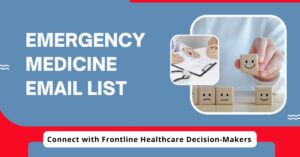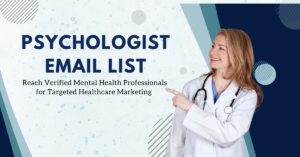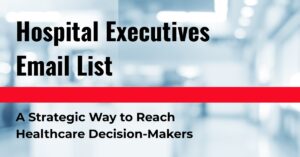In today’s rapidly evolving healthcare landscape, marketing strategies play a crucial role in driving engagement, enhancing brand visibility, and increasing patient and provider outreach. As healthcare organizations navigate complex regulatory environments and shifting patient expectations, effective marketing strategies in healthcare systems become indispensable for growth and sustainability. This blog explores how targeted B2B marketing strategies impact healthcare businesses and help them connect with the right audience.
The Growing Importance of Marketing in Healthcare Systems
Healthcare organizations, including hospitals, pharmaceutical companies, medical equipment suppliers, and healthcare IT firms, must embrace strategic marketing initiatives to stay ahead. Unlike traditional industries, healthcare marketing must balance promotional efforts with ethical considerations, compliance regulations, and patient-centric messaging. This shift has led to the adoption of advanced digital strategies, data-driven campaigns, and personalized outreach efforts tailored to specific B2B needs.
Key Marketing Strategies in Healthcare Systems
1. Data-Driven Targeting for Precise Outreach
The success of B2B healthcare marketing depends on accurate, up-to-date databases. Businesses leverage healthcare data analytics to segment their audience effectively, ensuring their messaging reaches decision-makers such as hospital administrators, procurement managers, and healthcare providers. Data-driven targeting enhances lead generation, reduces marketing costs, and improves engagement rates. With predictive analytics, businesses can anticipate client needs and create proactive marketing campaigns.
2. Content Marketing and Thought Leadership
Healthcare professionals and organizations seek credible, informative content before making decisions. Whitepapers, industry reports, and case studies provide valuable insights while positioning businesses as industry leaders. Engaging blog posts, webinars, and newsletters help nurture relationships, educate potential clients, and establish authority in a competitive market. A consistent content strategy helps build brand trust and keeps businesses relevant in a dynamic industry.
3. Multi-Channel Digital Marketing
A robust online presence is vital for healthcare businesses. Implementing a multi-channel digital marketing strategy—including search engine optimization (SEO), email marketing, paid advertising, and social media engagement—helps organizations reach their audience efficiently. Optimizing websites and landing pages with relevant keywords ensures higher search rankings, increasing inbound leads. Integrating data from multiple channels allows businesses to refine their approach and maximize engagement.
4. Personalization and Account-Based Marketing (ABM)
B2B marketing in healthcare has evolved beyond generic campaigns. Account-Based Marketing (ABM) enables companies to craft personalized messages for specific healthcare organizations and decision-makers. By leveraging CRM tools and AI-driven insights, businesses can tailor their outreach to address the unique pain points of potential clients, resulting in higher conversion rates. This hyper-focused approach ensures that marketing efforts are more effective and yield a higher ROI.
5. Compliance-Driven Marketing Approaches
Marketing in healthcare requires adherence to stringent regulatory standards, including HIPAA and GDPR compliance. Ensuring that all marketing communications align with legal guidelines not only safeguards businesses from legal repercussions but also fosters trust among clients. Transparency and ethical messaging help healthcare businesses build lasting relationships with their audience. Implementing compliance-driven marketing ensures long-term credibility and strengthens business reputation.
The Role of Marketing Automation in Healthcare
Automation tools streamline marketing efforts by enhancing efficiency and ensuring consistent engagement. Automated email campaigns, chatbots, and AI-powered lead nurturing improve response times and help organizations maintain ongoing communication with prospects. Integrating customer relationship management (CRM) software further strengthens lead tracking and conversion efforts. These automation tools not only reduce manual workload but also enhance precision in targeting the right audience. By analyzing customer behavior, automation enables businesses to send personalized messages at the most optimal times.
Measuring the Success of Marketing Strategies
Tracking key performance indicators (KPIs) is essential to evaluating the impact of marketing initiatives. Metrics such as website traffic, email open rates, conversion rates, and customer acquisition costs provide insights into campaign effectiveness. Data-driven insights allow businesses to refine their strategies and maximize return on investment (ROI). Continuous monitoring and adjustment ensure that marketing efforts remain relevant and aligned with industry trends. Businesses that leverage real-time analytics can proactively optimize their campaigns and improve engagement rates.
Challenges and Future Trends in Healthcare Marketing
Despite the numerous benefits of digital marketing in healthcare, businesses face challenges such as data privacy concerns, evolving technology trends, and increasing competition. However, emerging innovations like AI-powered analytics, predictive marketing, and virtual engagement platforms will continue shaping the future of healthcare marketing. Companies that embrace these trends and adapt their strategies accordingly will maintain a competitive edge. Additionally, the rise of telehealth and remote care solutions demands more dynamic and adaptable marketing approaches. Staying ahead of technological advancements will be crucial for businesses to differentiate themselves in the evolving healthcare landscape.
Final Reflections
The impact of marketing strategies in healthcare systems extends beyond brand visibility—it directly influences business growth, customer trust, and long-term sustainability. By leveraging data-driven targeting, personalized outreach, and compliance-focused marketing, healthcare businesses can effectively reach their audience and drive meaningful engagement. As the industry evolves, embracing innovation and optimizing marketing efforts will be key to long-term success in the healthcare sector. Moreover, strategic marketing helps healthcare organizations build lasting relationships with industry stakeholders, fostering collaboration and trust. By continuously adapting to market demands and technological advancements, businesses can position themselves as leaders in an increasingly competitive healthcare landscape.
Visit our website Med Stream Data for more healthcare industry related information!







